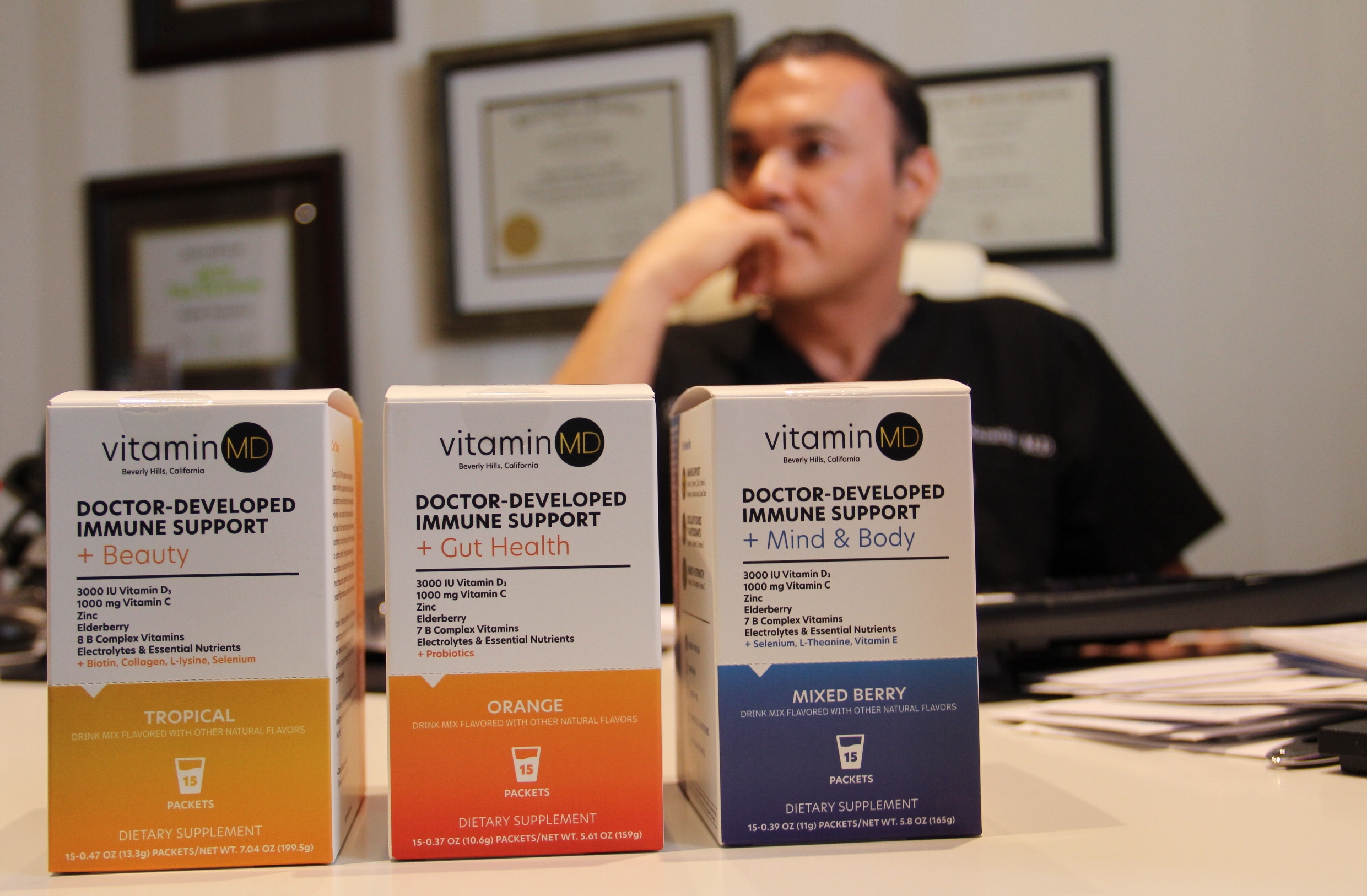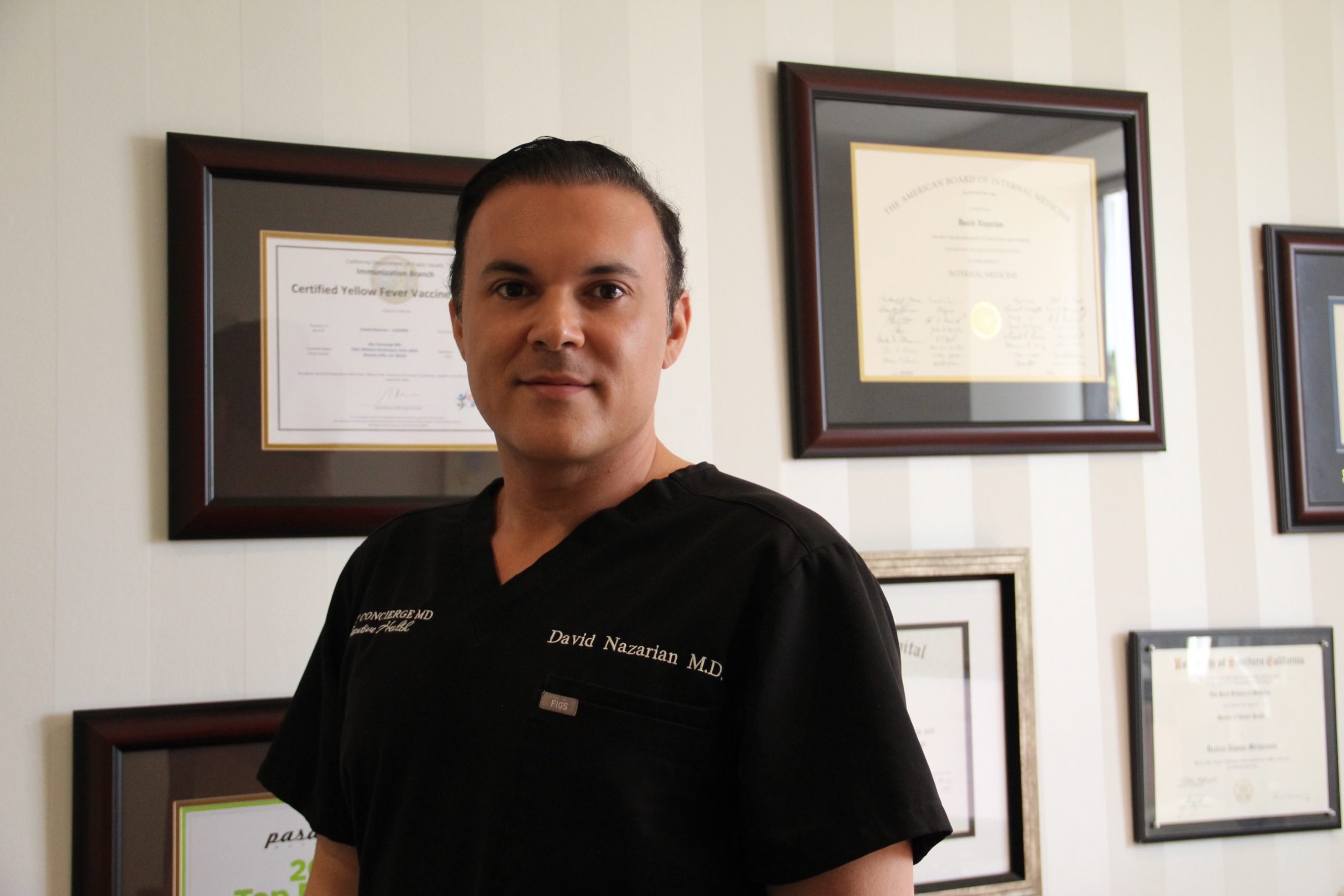One of the greatest things about living in Los Angeles is discovering the incredible people who live here. I was recently made aware of Dr. David Nazarian who practices concierge medicine in Beverly Hills. Intrigued by its appellation, I decided to dig deeper into his specialty. The word concierge is used quite often these days, and you never really know which meaning applies. In this instance, it means a doctor who comes to visit you, a luxury in the US, but commonplace in France where I am from.
Dr. David Nazarian obtained his Bachelor of Sciences in Biology and Psychology, from the University of California, Los Angeles. He received his Doctorate of Medicine from Sackler School of Medicine/New York State Program and completed his medical training at Huntington Memorial Hospital a USC affiliate hospital, before becoming Board Certified with the American Board of Internal Medicine.
Dr. Nazarian started “My Concierge MD,” after working with patients in the entertainment industry who required more flexible medical hours and provided care for patients in the convenience of their home, hotel or place of work. Although he continues his close relationship with many studios, he now provides the same level of concierge medical care to patients throughout the Greater Los Angeles Area. Dr. Nazarian likes to focus care on the person’s complete health and places a strong emphasis on prevention and early detection. He also makes use of all appropriate therapeutic approaches to obtain optimal health and wellness for his patients. Today, Dr. Nazarian specializes in weight loss, regenerative medicine and Perimenopause.
With weight loss being such a popular trend, and Perimenopause such a daily subject, I had to meet him. We sat in his office for quite a while, and there I was able to get the answers to my questions.
Why did you choose to become a concierge doctor?
I appreciate and love practicing the way medicine was practiced before. I like to know my patients. I like to focus on prevention, anti-aging, early diagnosis and to be able to form a bond with them [patient] and take care of them. Unfortunately, medicine has changed throughout the years. It’s really become rushed; not really knowing your patients and having the ability and time to dedicate to them and focus on other facets of medicine. That’s why I decided to do concierge medicine; so I have more time to spend with patients, get to know them, develop a relationship with them and focus on anti-aging medicine; helping them feel better, look younger and prevention.
As an internist, why did you decide to specialize in weight loss?
Initially, right after I did my training, I ended up working as a hospitalist. I took care of patients in the hospital, who needed to be admitted to the ICU, cardiac unit, etc. Then I went and worked as an emergency room doctor. After that, I did outpatient work for a company affiliated with entertainment. I was familiar with taking care of outpatients, emergency medicine, etc. so I was able to do an array of things. I enjoyed going out and seeing patients. Once I started to practice, the goal was to take care of the whole person, a holistic approach to healthcare. Weight Loss has huge effects on health. I trained in weight loss; I do hormone replacement therapy for patients…
What kind of hormonal replacement?
It’s a natural bio-identical hormone replacement. The best way to take this is orally. It’s sublingual and dissolves under the tongue. For menopause, it’s a combination of estrogen, estradiol, and progesterone. For males, we do testosterone replacement injections.
What about hormonal replacement in pellet form?
For some people pellets work fine. But I’ve found if you check levels, the pellets are not as stable. It depends on the pellet. Sometimes you’ll get a drop off in hormone levels versus if you do oral, it’s steady all around.
I’ve been doing hormone replacement for a long time. That’s something that I trained for in training seminars with people from around the world. If you look at all of the literature, hormones have so many benefits.
Do you start with blood work for hormonal replacement?
Yes, we do blood testing: levels, kidney function, liver… We check estrogen, progesterone, testosterone, FSH, LH. A lot of people come to me when they start having perimenopause symptoms and hot flashes, but I have people who come in who are well into menopause and they’re just not feeling their best. We optimize their hormones.
Before, they used to recommend hormones for everyone. There is a big study called the Women’s Health Initiative which found that there was an increase of breast cancer, so then they stopped it. But if you look at the good metabolite of estrogen, which is estradiol, and you do a combination of estrogen & estradiol, and progesterone & testosterone, the benefits include: bone density, skin, youthfulness, memory, sleep, etc. You look and feel younger and better. You have to do all of the preventative stuff as well.
When women go through menopause, you definitely gain weight.
I do the executive health physicals. Patients come in once a year and we do diagnostic testing. We do bone density, body composition testing, tumor and cancer markers, vitamins, hormones. We do screening ultrasound tests. So, we look at ultrasound of the thyroid, we look at the carotid intima-media thickness, which is a layer. If you have plaque, it’s associated with coronary artery disease. We look at the aorta, looking for an aneurysm. We look at the heart, the function, valves, etc. and the organs of the abdomen. We do stress tests, vision, hearing, nutrition consult.
You’re a one-stop shop.
Yes, we find out where the patient’s baseline is and where they need to improve. We also do IV-vitamin therapy. I also have training in sleep medicine because sleep is a big part of longevity. If patients are not sleeping well, we have in-home sleep study tests they can do.
Do you believe in CBD?
It has benefits, it works. For sleep, yes. Vitamins play a big role; a lot of people have vitamin D deficiency, which also affects sleep. We rule out if there are underlying reasons why people are not sleeping.
With weight loss and all of these different injections that exist, is there a difference between them or are they essentially the same and just different manufacturers and labs?
I started doing weight loss over a decade ago. We started using these injections well over two-three years ago, before they were popular. The initial ones were Saxenda and Trulicity. Then the semi-glutide injections which are Ozempic and Wegovy. And then the tirzeptide, Mounjaro and Zepbound. The difference between the semi-glutides is they are a glucone like peptide. They basically decrease your appetite, decrease the GI motility, so when you eat things move slower and you feel fuller faster. Glucose is utilized more, helping the pancreas produce more insulin and decreasing insulin resistance. They are amazing medications that work great.
What if your problem is not the amount you eat, but because of menopause. Are these medications still effective?
It is still effective, but that’s why we try to rule out all of the reasons. When someone comes to me for weight loss, I still do a full blood test. We have something called lipotropic injections, which is MIC made out of three amino acids. It helps the liver breakdown fat.
When can you not do these injections?
If there is family history of a specific thyroid cancer. Otherwise, it’s a safe medication. So far I have not had anyone who needed to stop because their kidney function was off.

How long after you begin taking the injections do you see your weight decreasing?
Some people are more sensitive to these medications even at the starting dose when the pens come in. At one point there was a shortage for these medications because they are used for diabetes. I tested a lot of different compounded medications and found one that I think is the best. We have a pharmacy created for us and there are advantages to that. A) You don’t have to worry about a shortage. B) Since it comes in a vial, you can actually titrate the dosage. We will start lower and titrate up over a month. Let’s say, if your appetite is not suppressed and you’re not having side effects after two weeks, you can go up. As long as your appetite is suppressed then you can stay at that dosage. Once a patient has reached their weight loss goal, some patients decide to keep maintenance for a period of time, while others will start to decrease the dosage. It’s nice because you’re not stuck with this dosage that the brand names come in. The compound costs a fraction and is more affordable too.
The brand names are expensive.
Yes, if insurance doesn’t cover it, it’s expensive. Insurance will not cover unless you are diabetic and even then, it’s become harder and harder. Because there is such a demand.
Are the positive effects of these injections sustainable over a long term period?
So far, all of the research and literature that has come out about these medications have all been positive. Blood sugar, insulin resistance, hypertension, cholesterol, inflammatory markers; all of these have shown to improve as you lose weight. There are some benefits that have shown to help with addiction and substance abuse. People tend to drink less alcohol, or even stop smoking while taking these medications.
These medications work, but they have to be in combination with: diet, trying to cut out certain carbohydrates, protein, etc.
You started your own product addressing multivitamins called VitaminMD.
Everyone kept asking me what they should take for their immune system, energy, just overall health. And I couldn’t find something that had everything encompassing. I always liked the EMERGEN-C packets. I always liked drinking that or taking something in liquid format. Liquid has better absorption than tablets anyway. But EMERGEN-C just has vitamin C, some of the B-complex, B-12, some electrolytes, that’s it. The reason there’s damage caused as we age is because of free radicals which cause damage to cells. If you have things that are high in antioxidants, they can be preventative.
So I did research looking at all the things that, in the medical literature, is shown to be beneficial and needed for someone to take daily, especially Vitamin D3. There is a core ingredient list: Consists of a powerful blend of vitamin D, vitamin C, Zinc, Elderberry, 7 B complex, essential Electrolytes and nutrients, propriety blend of Camu Camu, Acerela Juice and Ashwagandha.
I specifically formulated this myself, based on what I thought was best. There are three different SKUs:
Beauty blend also has Collagen, Biotin, L-Lysine, Selenium for healthy nails, hair and skin.
Mind & Body also has Selenium, L-Theanine, Vitamin E for cognitive function, memory, sleep, and relaxation.
Gut health also has 1 billion count of powerful Probiotics.
A lot of people take these separately as tablets but these are all in packets. You put it in a glass of water and drink one a day.
—–
Dr. Nazarian’s strong interest in academics has led to several published articles, as well as serving on the medical staff at four different hospitals in the Los Angeles Area.














